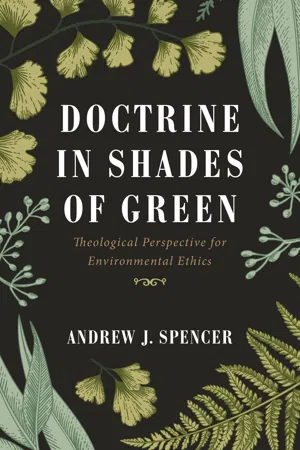![]()
PART ONE
THE GROUNDWORK
![]()
CHAPTER ONE
Introduction
In the flood of green messages that surround us in Western culture every day there are basic assumptions that people make as they classify each other. “Ecofriendly” means politically and theologically liberal. “Conservative” means denying climate change, driving a big SUV (but let’s be honest, a lot of liberals drive these, too), and trying to own the libs by not recycling. That is, at least, the messaging that we get bombarded with.
The problem with consistent messaging is that eventually people start to believe it, even if it requires denying the logical results of one’s core beliefs. The stereotype sometimes becomes a reality and things that are “off normal” strike us as odd. As a result, people are sometimes surprised to find out that I go to the small Baptist church down the road that holds to the inerrancy of Scripture, but I also have solar panels on my roof and pollinator gardens in my yard. Just to confirm that I’m weird, I usually let people know that I keep my house at about the recommended 63°F in the winter and 78°F in the summer. My theological convictions drive my environmental ethics and lead me to invest time, money, and energy into choices that tend to be much more popular on the other side of the political and religious divide.
This book wrestles with the theological underpinnings of environmental ethics from four distinct theological perspectives along the spectrum of Christian belief. One goal of this book is to show that a wide range of Christian theology can support an earth-positive environmental ethics. Therefore, there is little need for people to change their doctrines to suit the demands of ecology. At the same time, though many people from different forms of Christianity may arrive at similar ecological practices, we should not gloss over the real theological differences, which explain some of the divergences in policy preferences between, say, a theological liberal and an evangelical. A second goal of this book is to provide some points of contact between theological streams that can lead to better cooperation where possible and better dialogue where differences remain.
Thesis
In this book, I seek to show that divergences between Christian environmental ethics are largely explained by responses to four particular theological questions. Together, these four questions form a theological perspective for environmental ethics. The contents of a theological perspective provide a structure for analysis, which can simplify complexity and illuminate obscurity in the ongoing debate over the appropriate Christian approach to environmental ethics. This book examines the theological perspective for environmental ethics of four different theological streams that diverge along a theological spectrum. The object is to provide a common framework for engagement between theological streams rather than to critique any particular perspective.
There has already been enough blame-throwing to last a few millennia. For example, division among Christians on the issue of the environment has been exacerbated by Lynn White’s historic essay that blames a Christian worldview for ecological degradation. Since “The Historical Roots of Our Ecological Crisis” was published in 1967, the Christian environmental debate has been framed as a response to White’s thesis. Some scholars are coming to recognize how stultifying that approach has become to meaningful dialogue on environmentalism. Among orthodox Christians, a great deal of ink has been spilt in defending Christianity against the attack levied by White. This defense has undermined positive efforts on environmental ethics, so that positive theological statements have lagged behind. The constant battling over whether Christianity is good for the environment means that little attention has been paid to the specific theological methods used to develop Christian environmental ethics and few attempts have been made to understand the theological structures in place beneath those environmental ethics. Lately, battles over the so-called Green New Deal have made it even more difficult to begin talking about environmental ethics because of emotionally charged divisions within the culture.
A survey of theological perspectives of Christian environmentalists is an important pursuit at this point in Christian history because of the growing distance between the ethical formulations, driven by diverse theological methods, of various streams of Christianity. Paul Allen notes this divergence of theological method, arguing,
According to Allen, “Twentieth-century theology has, by and large, adapted the theological developments of the nineteenth century to a culture that is no longer habitually Christian.” At this point, early in the twenty-first century, these sentiments indicate a need for an examination of the theological methods that support various environmental ethics.
An examination of theological methods used by diverse environmental ethicists, with due consideration of theological foundations, will enrich the understanding of environmental ethics among Christians. But full-scale analyses for each interlocutor in such a widespread debate will not be done here for two reasons. First, because many of those who write about environmental ethics from a Christian viewpoint have not written sufficiently to substantiate thorough analysis of their theological methods. Second, even if there were sufficient material to analyze, a complete assessment of each writer’s theological method goes beyond what this project requires. Instead of complete analysis, theological perspective...
